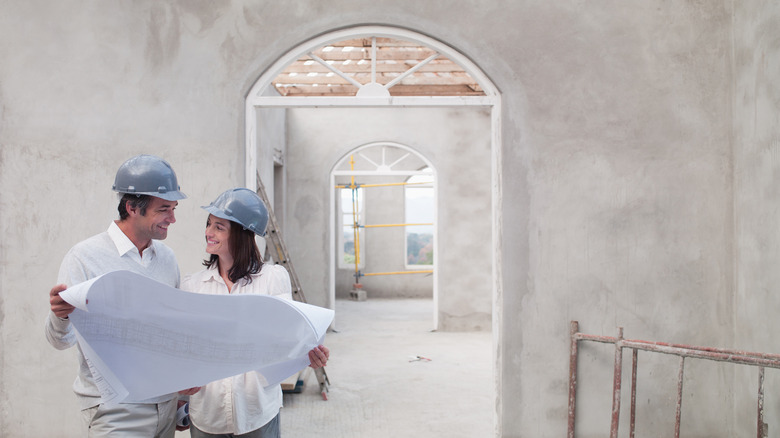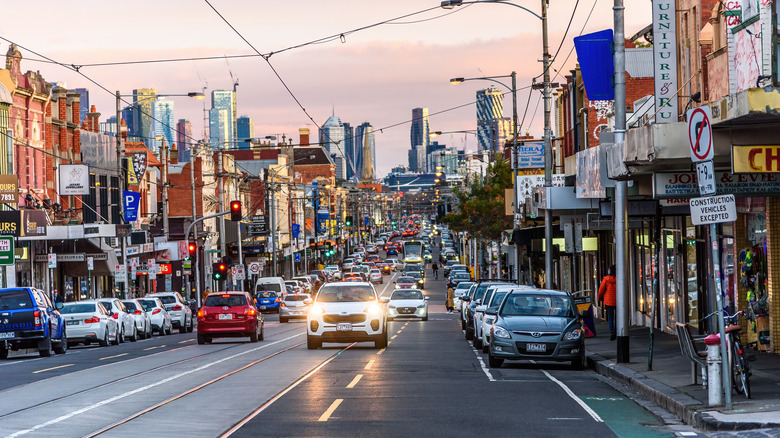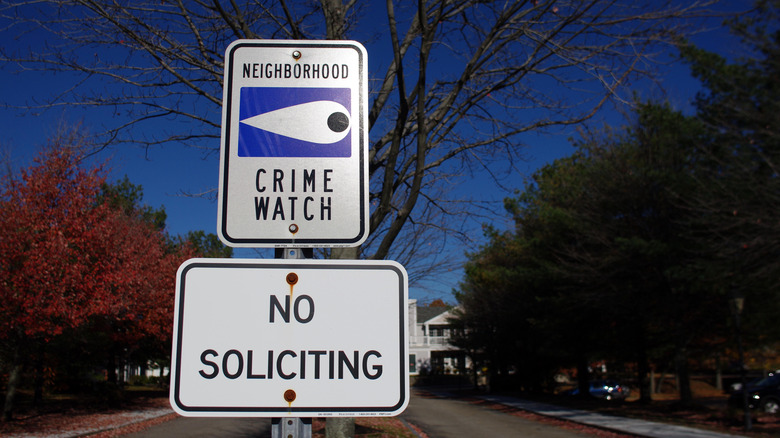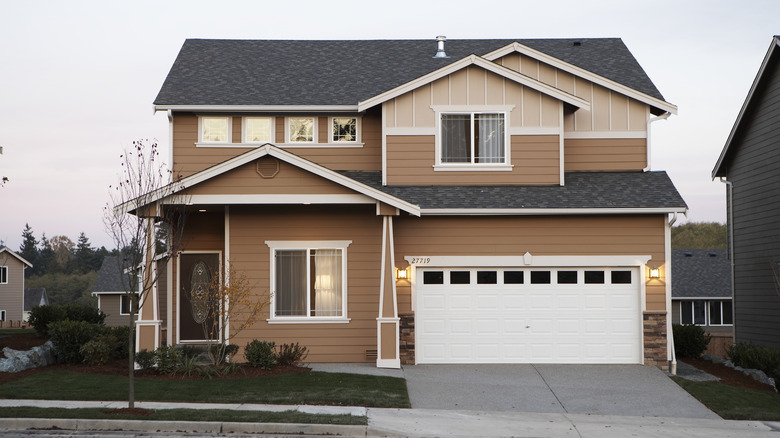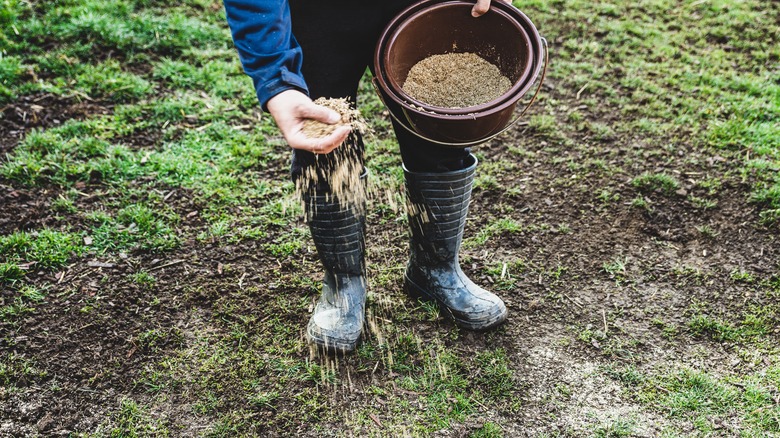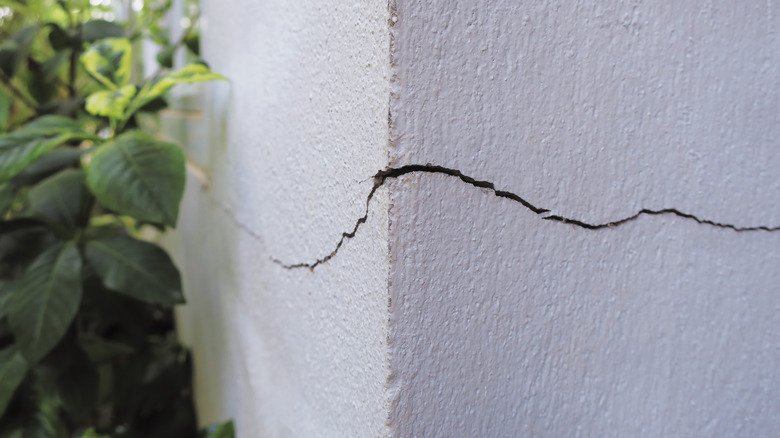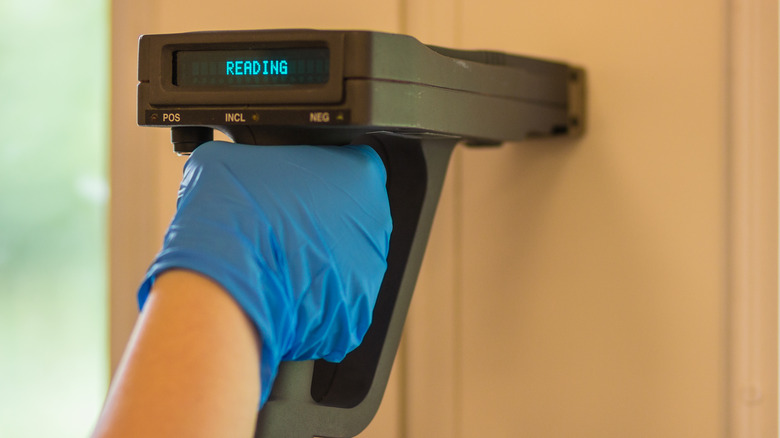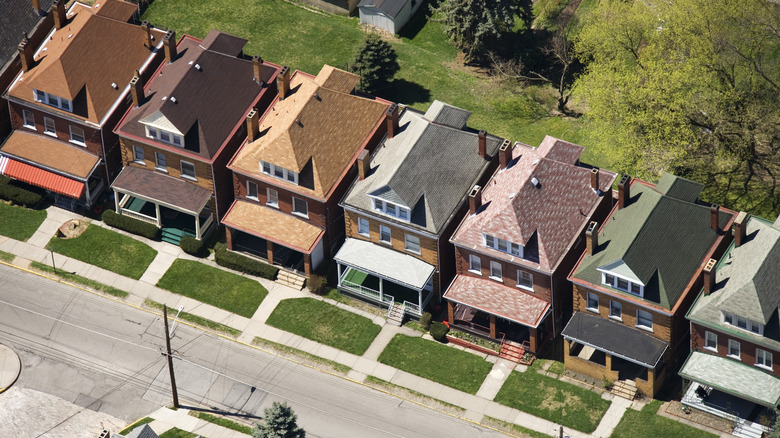What To Look For In A Flip House
House flipping is becoming more and more popular. According to The Atlantic, this uptick in interest in renovations can be, at least partially, attributed to the widespread popularity of home improvement shows on networks like HGTV. It's hard not to want to get in on the action when you see Chip and Jo turn a falling down shed into a stunning farmhouse on "Fixer Upper." The same could be said for Ben and Erin Napier's work around their "Hometown" of Laurel, Mississippi.
Each year, roughly a third of all homes in the United States are sold to people who won't make them their primary residence. Instead, the homes might become luxury vacation rentals, regularly tenanted properties, or the ever-popular house flip. If you are dipping your toes into the world of renovation, you might not know what to look for when selecting a house to work on. That's why we've rounded up the most important qualities to look for in a property if you want to get started flipping houses.
Consider homes with minor needs for your first flip
When searching for a house to flip, you have to be realistic about your renovation abilities. If you take on a project that's outside of your knowledge base, you will have to hire a contractor to do it for you. This can easily cut into your overall profits. Instead, when you are getting started, pick a house that just needs new flooring and a fresh coat of paint, not a complete remodel.
According to Sammamish Mortgage, there are a number of DIY renovations that require relatively low experience levels and would be perfect for newer flippers. If the home needs a bit of updated curb appeal, replacing the front door is a simple task that you can do in just one afternoon. You can also repaint each of the walls in the living areas, as well as spruce up the baseboards and moldings. If you have a bit more DIY skills, you can start doing things like ripping up old carpeting and putting in more modern options or installing new tile backsplash in the kitchen.
Avoid homes on a busy road
Homes along busy roads can be a major turn-off for most buyers. Even people who don't plan on flipping their homes for profit worry about how purchasing along a thoroughfare might impact them if they ever need to move. The house will still sell, but it could be sold at a loss, or for significantly less than homes around it. In fact, homes with a lot of traffic passing by are consistently valued less than comparable homes on more quiet streets.
While living in the middle of the action might cut down on your commute time because you have easy access to the road, most people just can't get over the drawbacks. Namely the lack of privacy you have, the constant parade of road noise, as well as the safety hazard to pets and young children. Even homes that simply back up onto a busy road can be impacted by these issues. So to get the maximum value for your flip house, pick one just off the busy road instead or you potentially won't make all of your money back later on.
Look for a home in an area with growth
When looking for a house to flip, you want to pick somewhere that is on the up. Before putting in an offer on a listing, there are a few telltale signs to consider. According to Money Crashers, you need to consider both the economic and social aspects of the community. Are companies moving to the area to set up shop? Are other homes in the neighborhood selling for a good price? You should take a look at other recent sales in the vicinity of the home you want to flip to get a better idea of what the local market is like.
You should also do a drive-through of the area to assess the overall vibe. Does there seem to be a lot of restaurants in the area? Are they busy? Talk to a few nearby business owners to see if they are flourishing and seeing growth. Also, keep an eye out for construction around the area. If other homes are being flipped, or businesses are doing facelifts, you'll want to buy in while you still can.
Be sure to buy in an area that is safe
Your flip won't sell if there are high rates of crime in the neighborhood. According to Rocket HQ, there are a few quality tests to run before buying a house to determine how safe the area is. The first is to run the address through the National Sex Offender Public Registry. This way, you will know if any registered offenders are nearby and how that might impact your ability to sell the house to families, for example. In addition, check the neighborhood out on a local crime reporting website, like LexisNexis or similar to ensure the statistics for the area are quite low.
Once you have determined that the home is in a statistically safe area, be sure to double-check things for yourself. As you walk or drive around the neighborhood, what do you notice? Are there neighbors outside walking their dogs or enjoying the parks? Do the other homes need major repairs, or do they seem to be in good shape? No matter how great of a house you put together in your flip, if the neighborhood isn't inviting, buyers might not be tempted to bid big.
Avoid custom builds
According to Blythe Building Company, resale value is something very important to consider when building a custom home. When buying one to flip, it's equally so. If a home was made with one person in mind, it's going to be harder to flip because those customizations often won't appeal to the general public. You might have your work cut out for you going back through and adjusting the home to be more accessible to everyone. This could be things like removing textured ceilings, updating built-in electronic items which, let's face it, are probably already out of date, or even scrapping lawn features that would be too much work to keep up.
If the person you are purchasing the flip house from hasn't put much thought into making it work for everyone, then that responsibility is going to fall on you. If you are eyeing a custom build as a flip, you might have to consider really gutting the property. However, if it has timeless features and is in a good location, it still might be a profitable choice (per Thomas Sattler Homes).
Purchase homes with terrible yards
If the home's curb appeal is the only thing that's lacking, it's an easy fix as bringing a yard to life can be a very rewarding process. According to a study by the National Association of Realtors, when taking care of your home, your lawn can yield up to a 267% return on investment. That's pretty major. So if you purchase a home with brown grass and dead trees, your first order of business is going to be bringing them back to life again.
If the home doesn't have any trees in the front yard, consider adding a few. Most things you purchase will drop in price over the years, but as trees grow older, they become more valuable (via University of Washington). The shade they provide is also a great selling point. Similar things can be said about beds brimming with colorful blooms, gardens with fresh mulch, and a tidy and well-maintained front sidewalk. You can turn around a yard in just a day or two with a little bit of elbow grease, so when thinking about a flip house, don't let a dead lawn turn you off.
Think about homes near amenities
When selecting a home to flip, you want to think about its surroundings and whether or not iy will appeal to many buyers. Think about the amenities that are easily accessible from the home. Is the property near public transportation? If not, does it come with parking so buyers never have to fight for a spot? What about local parks for children to play, or other green spaces for adults to hike and bike?
According to American Enterprise Institute, our access to public amenities can greatly impact our moods and behavior. If we can walk to a library, enjoy a class at a nearby gym, and find all of our favorite foods without driving too far, we are far more likely to be happier. We are also more likely to trust our neighbors and recommend our area and way of life to others. If we live somewhere without these things, we are far more likely to feel cut off from our community and depressed. So before you make it to the closing table, think about the little things. What restaurants offer delivery to the address? How far do you need to drive to attend a sports game? All these little things can really add up and be great selling points down the line.
Study the floorplan before making your purchase
Poor floor plans require a lot more work and time to fix when you are renovating a house. According to research from Rightmove, being able to check out a floor plan can make or break a potential buyer's interest in a home. Even more so, a good floor plan can make or break your house flip. You don't want potential buyers walking through your flip struggling to open awkwardly placed doors, or wondering why there is a bathroom right off the kitchen.
When thinking about the floor plan, consider what makes a space more livable. For example, biophilic design, which incorporates outdoor elements indoors, has become increasingly popular since the lockdowns of the COVID-19 pandemic. This could be things like oversized windows, skylights, and large sliding glass doors. The same could be said for flexible spaces within the home. These are usually open areas that can double as living, dining, or working areas. So a third bedroom could easily be turned into a home office, a yoga studio, or even a media center for an in-home movie theater.
Avoid homes with major structural issues
Many think that the entire purpose of flipping houses is to purchase the most rundown properties you can find and turn them into perfect dream houses. While this is certainly ideal, if you are going to sell the home for a profit at the end of the process, there are some major repairs that you should avoid. Purchasing a home with things like black mold in the walls, cracks in the foundation, or a rotting roof are major red flags. All of these repairs can easily turn into a money pit a lot quicker than you might think.
For example, according to Regional Foundation Repair, a new foundation installation is about $12,000. That's a pretty big chunk of change for just one part of the house. Typically, a house with a cracked or bowing foundation wouldn't even pass the inspection phase and the current owners would be required to fix it, or at least offer a massive discount off the asking price. Even if you are planning to flip the house, you should ask for the same deal. In the same way, a new roof can cost up to $10,000 and is also typically a major point of contention between buyers and sellers (via Rennison Roofing). Don't let your willingness to renovate cheat you out of a good deal.
Select homes at the bottom range of your budget
When you are flipping a house, unfortunately, it's quite easy for a gross profit to become a net loss as the repair bills add up. According to First Capital Trust Deeds, it's important to take a look at your finances early in the process to avoid this happening to you. The first step is to select flip houses at the very bottom range of your budget, especially if you are just getting started in the industry. This way, you have a larger cushion of cash to shelter you from unexpected mistakes or delays in the process.
When possible, buy the home you intend to flip in cash so you don't have to worry about mortgage financing. If that isn't possible, put down at least 20% as a deposit, if not 25%. Just like closing on a house that you intend to live in, you'll also need cash upfront for closing costs, inspection fees, and if you're getting a mortgage, loan origination fees. After forking all this over up front, you want to have as much liquid capital available to you as you begin the renovation process. So while you might be able to technically afford the home that is $20,000 more, consider if it's worth the stress of an unhealthy budget down the line.
Purchase homes built after 1978
When selecting a house to flip, you can save yourself a lot of hassle and hazards by avoiding homes built before 1978. This is because 1978 was the year that using lead paint was finally banned from use in homes. According to the EPA, doing any sort of renovation to a home built before this year opens the door to potential lead poisoning. If you are doing renovations in your own home, the rules still apply for your safety, but the agency cannot enforce them. If you are working on a home you intend to sell for profit, you must follow the EPA guidelines to a tee, including hiring an EPA-approved contractor.
Lead poisoning can show up in a number of ways, including weight loss, sore joints, brain fog, seizures, high blood pressure, and even loss of pregnancy (via Mayo Clinic). Lead wreaks havoc on the human body, but unfortunately, we often don't find out about the poisoning until the exposure has been constant for weeks. This can lead to catastrophic consequences. It's really better for your flipping business and your health to simply try to buy a bit newer. If you do purchase a home before 1978, be sure to add a lead check to the home inspection phase so you know what you are getting yourself into.
Choose a home with a regular shaped lot
If you are going to buy a house to flip it, you want to pay close attention to the lot size it comes on. This is because home lots that are pie-shaped, oblong, or any other irregular size can deter buyers when you try to resell. According to Fresh Realty, square and rectangular lots are two desirable kinds. These lots provide homeowners with the easiest claim to property lines, as they are so easy to measure. They also offer more space that you can actually use in a yard to build a shed, put in a pool, or simply just enjoy because you don't have to worry about incorporating strange shapes. The same can be said for fencing these lawns, as the process will usually be easier since everything is in a straight line.
If you are purchasing a house flip on a cul-de-sac, it's likely that the home will be on a pie or triangle-shaped lot. This means that the front yard is usually very small, but the backyard fans out and ends up being quite large. Cul-de-sacs are usually lauded for their privacy, but homes at the end typically have less parking available, which can be a deterrent for some buyers.
